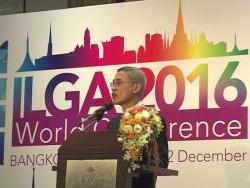Vitit Muntarbhorn remains UN independent expert despite fierce opposition

19 December 2016 - The new independent expert on Protection against Violence and Discrimination based on Sexual Orientation and Gender Identity remains in function. This became clear after a second attack of a block of 77 countries. Vitit Muntarbhorn held a keynote speech at the ILGA World Conference in Bangkok, where he outlined that he will take his mandate to not only include physical violence but also to other forms of violence common in schools.
Image: Vitit Muntarbhorn giving a keynote speech at the ILGA World Conference in Bangkok, November 30 (photo ILGA World).
Muntarbhorn includes education
The mandate of the independent expert was created last June by the UN Human Rights Council. Vitit Muntarbhorn, who is Professor Emeritus at the Faculty of Law, Chulalongkorn University in Bangkok, was appointed for the role in September, and formally started his mandate on 1 November 2016. The job is an unpaid function, but in the UN system "independent experts" are seen as truly independent experts who can offer impartial advice.
At a keynote speech for the ILGA World conference, Muntarbhorn gave 5 priorities he wants to work on: decriminalization, depathologization, status recognition of transgenders, gender diverse cultural inclusion and empathization. Especially the last two are very relevant for educators. Muntarbhorn defines "gender diverse cultural inclusion" as integration of LGBTI people in all ways of life, in other words: mainstreaming. With "empathization", Muntarbhorn means to promote a human rights sensitive and less binary (or non binary) educational and socialization process to address violence and discrimination from childhood onwards; to prevent bullying from a young age; and involve teachers, parents, communities, and children/youth in nurturing an all-inclusive understanding of sexual and gender diversity.
GALE has written a letter to the independent expert to cooperate on issues related to education.
Ongoing resistance of 77 States
However, a block of 77 countries has repeatedly tried to block the creation of the mandate and of its implementation. The block is composed of African, Caribbean and Islamic States as well as Russia and China. They cooperated first several times to stop the creating of a mandate in the first place. Their key argument is that LGBT people deserve no human rights, because in some cultures homosexual behavior and gender nonconformity are seen as a sin or a threat to local traditions.
When they failed to do this, a group of African States tabled a resolution at the Third Committee of the Human Rights Council to “allow time for further consultations to determine the legal basis” of the mandate. Almost 900 organizations from 157 countries mobilized to support the mandate, leading this hostile initiative to a failure. Nevertheless, only a few weeks later, a further attempt was tabled at the General Assembly plenary. Luckily, with a few votes, this second attempt to block the mandate was also voted down. This type of opposition to an independent expert is unheard of in the UN: never has any independent expert mandate been challenged after it was established. Even when losing the vote, the denying States made clear that they were not going to cooperate with the independent expert.


